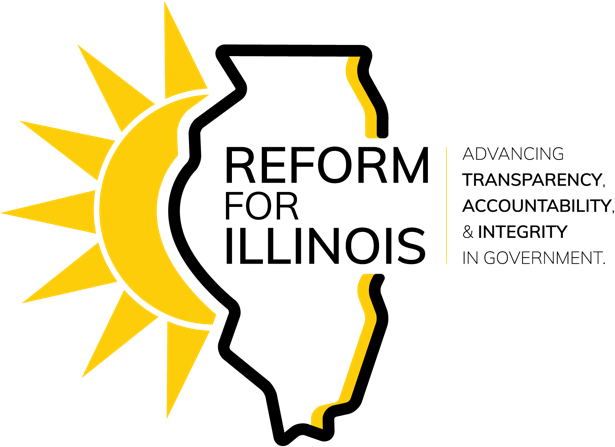First quarter campaign finance reports of 2022: We’re in for a bumpy ride
The first quarter of 2022 got off to an explosive start on the campaign finance front, with Governor JB Pritzker dropping $90 million into his own campaign account. While the quarter was slow for some, fundraising reports signal we can soon expect a tsunami of money in major races.
The Governor’s Race
As expected, the governor’s race is shaping up to be a multifront battle of the billionaires, with hedge fund tycoon Ken Griffin, Governor Pritzker, and shipping magnate Dick Uihlein duking it out with megadonations. Even Californian billionaires are getting in on the action, contributing millions to upstart Republican candidate Jesse Sullivan.
The Republican Primary
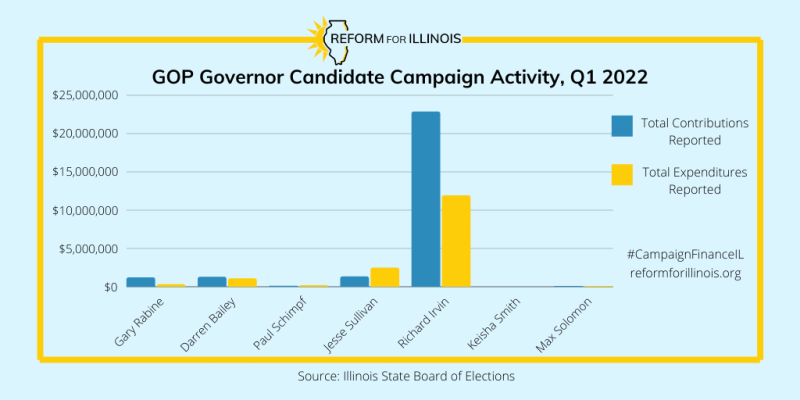
January brought Aurora mayor Richard Irvin into the governor’s race, followed by a blockbuster $20 million donation from Ken Griffin. With that contribution, Irvin’s total $22.1 million haul this quarter dwarfed all other fundraising among Republican gubernatorial candidates. Following reported expenditures of $11.9 million, Irvin has a healthy $10.9 million cash on hand as he enters the second quarter of 2022.
Griffin is probably just getting started in the governor’s race. With an estimated net worth of more than $30 billion, the Citadel CEO has more than enough funds to go head to head with Governor Pritzker, whose estimated net worth is about one eighth of Griffin’s. Pritzker spent a record-breaking $171.5 million on his election campaign in 2018.
Jesse Sullivan raised $1.3 million this quarter, compared to $293K in the last quarter of 2021. His largest donation was for $1 million from Kevin Taweel, the California-based co-founder of Asurion, with the additional $300K coming from donations of $50K or less. Mr. Taweel also donated $4 million to Sullivan’s campaign last year. Sullivan’s other top donors include billionaire Silicon Valley executive Chris Larsen, philanthropists Robert & Dorothy King, and Asurion Vice Chairman Gerald Risk, all of whom hail from California. About 96% of Sullivan’s total fundraising comes from California donors. Sullivan currently has $8 million in the bank, making him the candidate with the second highest cash on hand in the Republican primary.
Gary Rabine and Darren Bailey reported bringing in $1.1 million and $1.2 million respectively, both of which represent significant jumps from their $580K and $499K totals in the previous quarter. The bulk of both hauls came from megadonations; Rabine, who owns a concrete and asphalt business, lent his campaign $1 million, while state Senator Bailey received a $1 million donation from Dick Uihlein. Rabine ended the quarter with $851K cash on hand and Bailey with $900K.
What’s missing from these reports? Uihlein’s additional $2.5 million donation to Darren Bailey on April 1, the day after the quarterly reporting deadline. Uihlein donated another $1 million to Dan Proft’s newly created People Who Play By The Rules PAC on March 9th. We don’t know where that money will go yet, but we’ll keep our eyes on this super PAC’s spending over the next few months.
GOP contenders Paul Schimpf, Keisha Smith, Max Solomon, and Emily Johnson raised a total of $86K this quarter, with Schimpf raising the most at $78K.
On the Democratic side, Governor Pritzker gave himself $90 million early in the quarter and spent $17.1 million, leaving him with a cool $87.5 million in the bank at the start of April. Just $5,976.55 of his contributions came from non-personal funds. Pritzker’s largest expenditures were for voter contact consulting and media buys. His campaign committee also transferred $560K to other Democratic candidates and organizations.
Governor Pritzker’s primary challenger, Beverly Miles, reported just $260 cash on hand back in December and has not yet filed a report for the first quarter of 2022.
The Illinois Supreme Court: Caps Off; Ken Griffin Leaps In
Democrats currently have a 4-3 majority on the Illinois Supreme Court, but two vacancies are prime pickup opportunities for Republicans after the districts were redrawn last year. Republicans are particularly optimistic about their chances after Justice Kilbride’s failed retention vote in 2020, which became the most expensive race in Illinois Supreme Court history due to Ken Griffin’s massive money infusions.
Griffin held his fire throughout the first quarter of 2022, but on April 14 he gave $6.25 million to Citizens for Judicial Fairness, the independent expenditure group he and other billionaires including Dick Uihlein flooded with money to oppose Kilbride’s retention.
In addition, contribution caps are already off in all supreme court races, meaning we can expect to see some big donations to candidates soon.
In the 3rd District, Justice Michael J. Burke (R) has a slight edge in fundraising, with $235K cash on hand versus $130K for Justice Mary Kay O’Brien (D). Justice Burke reached the self-funding threshold last week after loaning his campaign the required $100K.
In the 2nd District, the State Board of Elections removed three candidates from primary ballots last week due to a dispute over the number of necessary signatures. The candidates are appealing the decisions, leaving the race on uncertain ground for now. Judge John Noverini and Judge Daniel Shanes are the remaining Republican candidates, with $129K and $251K in their respective campaign accounts. Judge Shanes also hit the self-funding threshold with a combination of loans ($45K) and donations ($56K) from family member Irene Shanes. Judge Noverini was just shy of the $100K threshold himself after loaning over $97K to his campaign last quarter. On the Democratic side, Judge Elizabeth Rochford now has $361K in her campaign account, while Judge Rene Cruz has $118K. Neither candidate has donated or loaned significant sums of money to their campaign so far.
Legislative Leaders
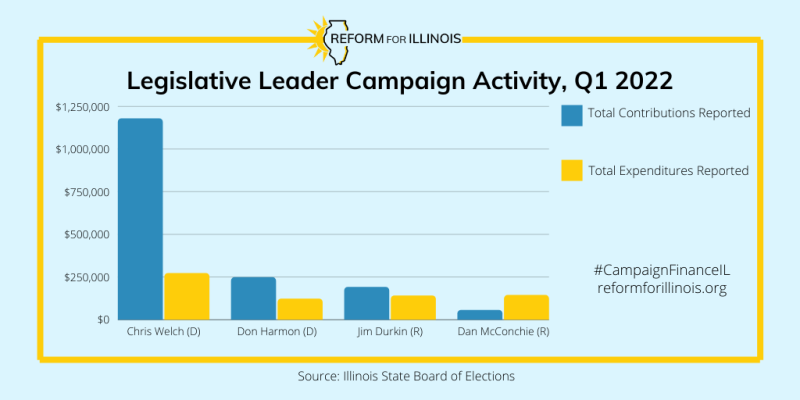
Compared to last quarter, legislative leaders had a slow few months. It’s not uncommon for fundraising among state lawmakers to drop in an election year’s first quarter compared to the previous quarter, and new restrictions on fundraising during the legislative session may have further dampened fundraising by statehouse incumbents. With an abbreviated session ending in April, though, they have plenty of time to make up for it.
Speaker Welch had the strongest showing among legislative leaders this quarter, raising $1.1 million and ending March with $8.1 million in his campaign coffers. This was a steep decrease from the last quarter of 2021, when his campaign raised $4.3 million. The bulk of Speaker Welch’s new campaign funds came from union PACs: $200K each from IBEW Illinois, Chicago Land Operators Joint Labor-Management PAC, and Carpentry Advancement PAC Fund. Welch, who’s not facing a competitive reelection challenge, spent $271K this quarter, with digital advertising ($49.4K), fundraiser reimbursements ($41.3K), and polling ($26.5K) making up his highest expenditures.
Senate President Harmon had a similarly underwhelming start to 2022: his campaign raised $246K, down from $5.7 million in the previous quarter. His largest contribution was for $150K from the Chicago Land Operators Joint Labor-Management PAC. Harmon transferred $13.5K to Democratic causes and groups this quarter, including $10K to Vote Yes for Workers Rights. Harmon’s largest expenditures were for consulting services, including $10K each to New Chicago Consulting, LLC, and Butcher Law Firm.
Even with smaller fundraising numbers this quarter, Welch and Harmon still outraised their Republican counterparts, House Minority Leader Jim Durkin and Senate Minority Leader Dan McConchie, by 5:1 and 4:1 ratios respectively. Notably, though, while neither Welch nor Harmon are facing a serious threat to their seats, neither have shared much of their mountains of cash with other candidates or committees as of yet.
A national Republican PAC blows Durkin’s caps
As of March 28, House Minority Leader Durkin is no longer subject to contribution limits thanks to the Republican State Leadership Committee (RSLC) PAC, which spent just over $100K in independent expenditures supporting his campaign and triggered Illinois’ “millionaire’s exemption” or “self-funding loophole.” The RSLC behind the PAC bills itself as “America’s Only Line of Defense Against Socialism in the States” and boasts board members including Karl Rove, Reince Priebus, and Barbara Comstock.
The Republican State Leadership Committee PAC also blew Durkin’s contribution caps in 2020, 2018, and 2016. In 2018, Leader Durkin took advantage of his lack of caps by accepting $6 million from Ken Griffin, accounting for almost two-thirds of his fundraising that cycle. He also received $5 million from Griffin in 2016, and broke nationwide state legislative fundraising records. Though those donations came considerably earlier in the election cycle than where we are now, we’ll be keeping a close eye on Durkin’s campaign now that his caps are off.
All the other legislative leaders loaned themselves the triggering amount for the self-funding provision. But while Harmon and Welch have taken ample advantage of the loophole to rake in huge contributions, Durkin and McConchie have not as of yet.
Read our recommendations for how to fix the self-funding loophole.
Leader McConchie reported bringing in $56K, down from $623K last quarter. He starts the second quarter of 2022 with $1.4 million in the bank. McConchie blew his contribution caps way back in August by loaning himself over $100K, but a $150K transfer from the Chicago Land Operators Joint Labor-Management PAC is his only contribution in excess of the contribution limits so far.
This quarter also saw some movement at last from Mike Madigan’s campaign committee: he spent $4 million on legal fees between January and March. It remains to be seen whether his use of campaign funds for legal expenses will be affected by the Illinois Supreme Court’s recent ruling in a case involving disgraced former Ald. Danny Solis. Madigan still has $6.4 million left in his account.
Party Committees
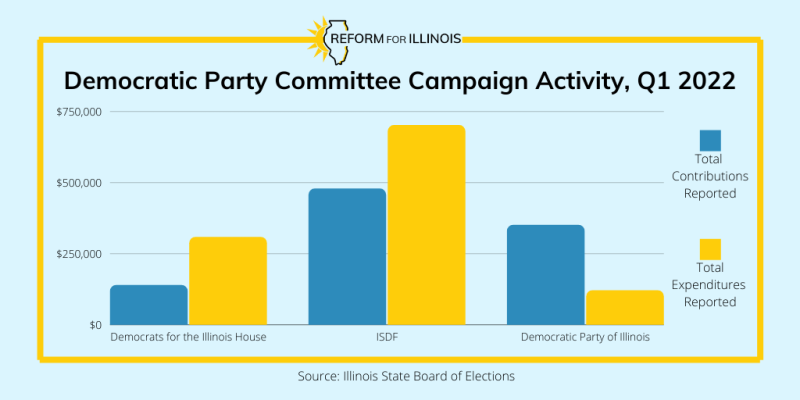
Much like the individual legislative leaders, the Democratic party committees raised significantly less money this quarter than they did in the last quarter of 2021.
Speaker Welch’s Democrats for the Illinois House raised $139K, compared to $2.7 million last quarter, and started the second quarter of 2022 with $4.4 million cash on hand. A $59.9K contribution from Chicago Land Operators Joint Labor-Management PAC was the committee’s largest contribution this quarter.
ISDF, the Democratic Senate caucus committee controlled by Don Harmon, reported $478K in contributions this quarter, down from $1.9 million last quarter. The vast majority of those funds came from the Illinois Democratic Heartland Committee, which transferred $437K to ISDF.
The Democratic Party of Illinois, which seemed to find its fundraising footing last quarter after raising $449K, raised $350K this quarter. DPI is not limited by the new restrictions on fundraisers during session, but its smaller fundraising total this quarter still fits its historical pattern: DPI also raised more money in the last quarter of 2017 than in the first quarter of 2018. DPI’s largest contributions this quarter came from union PACs, including SEIU Illinois Council PAC and Carpentry Advancement Political Action Committee.
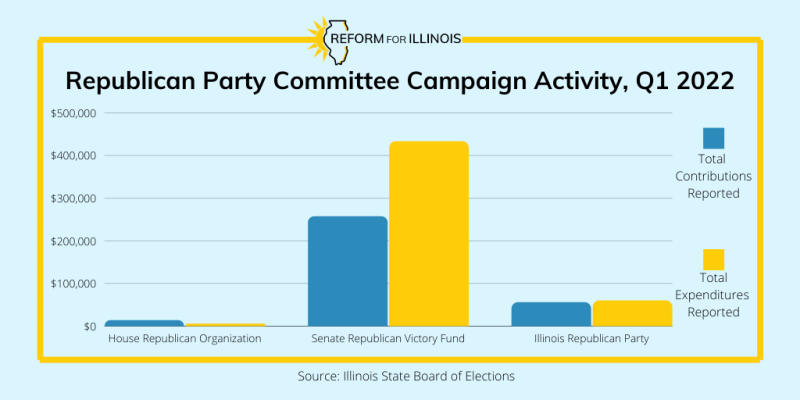
The House Republican Organization faced a steep drop in its fundraising, raising just $13K after $124K last quarter. A $6K donation from Rep. Deanne Mazzochi and two PAC transfers from Bank of America Illinois PAC and IL CPA’s for Political Action accounted for the entirety of the House Republican Organization’s fundraising from January to March.
The Senate Republican Victory Fund actually raised more money this quarter than last quarter, with $257K in receipts versus $171K back in December. Leader McConchie was the committee’s largest contributor; his campaign transferred $50K to the Senate Republican Victory Fund back in February. Research and consulting services accounted for the committee’s high expenditures this quarter.
Like the House Republican Organization and its Democratic counterpart, the Illinois Republican Party had a smaller fundraising total this quarter than in the last quarter of 2021. The Illinois Republican Party reported $55K in contributions this quarter, compared to $84K last quarter. One noteworthy contribution was a $12K donation from Elizabeth Uihlein.
Democratic Primary for Cook County Assessor
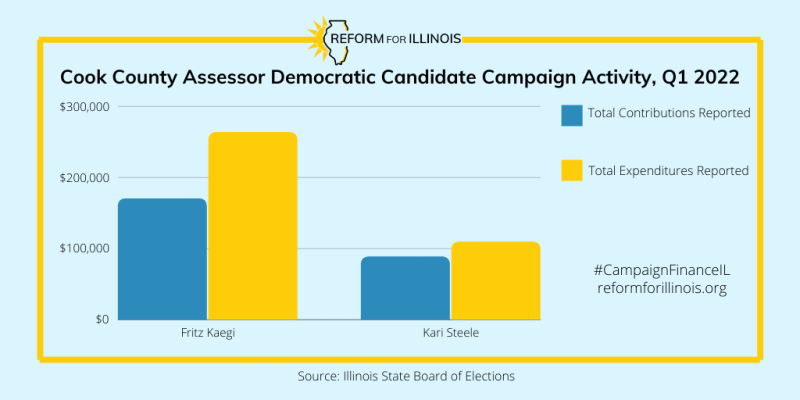
Neither candidate in the Democratic primary for Cook County assessor had a runaway lead in fundraising this quarter. Fritz Kaegi raised $170K, $65K of which was a personal loan to his campaign account, and Kari Steele raised $88K. Kaegi, though, begins the second quarter with $874K in his campaign coffers. Steele has just $107K cash on hand.
Kaegi spent $263K this quarter, most of which went to polling, consulting, and office space rent.
Steele’s receipts reveal some labor support, including a $20K transfer from LIUNA Chicago Laborers District Council PAC. Steele also reported a $5K donation from Willie Wilson, now officially running for Chicago mayor. Steele spent $109K, mostly on finance consulting and media consulting.
Secretary of State
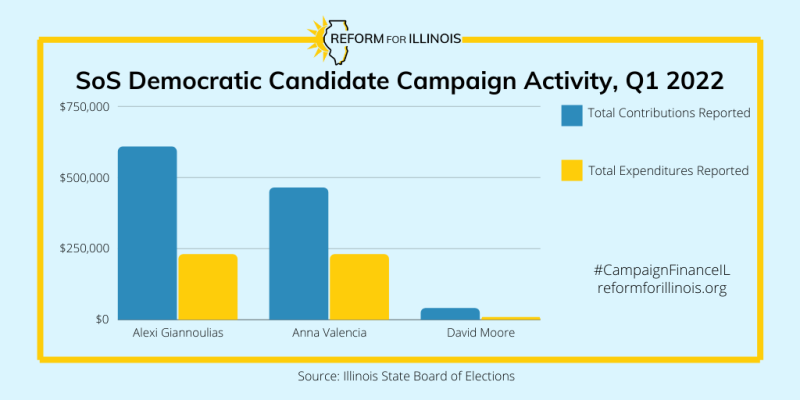
Alexi Giannoulias retained his fundraising edge in the first quarter of 2022, with just over $4.4 million in the bank heading into April. Giannoulias raised $607K this quarter –– less than the $658K he raised in the last quarter of 2021 –– and spent $230K. His largest contributions were from union PACs, including a $30K transfer from IBEW Illinois and a $15K transfer from North Central Illinois Laborers’ District Council PAC. Giannoulias’ largest expenditures were for consulting services, with $48.5K going to GBAO Strategies and another $40K going to The Strategy Group LLC.
Anna Valencia begins the second quarter with $1.1 million cash on hand after raising $463K this quarter. Valencia, in contrast with Giannoulias, raised more money in the first few months of 2022 than during the last quarter of 2021, when she raised $331K. Her campaign’s largest contribution was a $12K donation from R. Elliott LLC. R. Elliott LLC previously supported incumbent Secretary of State Jesse White’s campaigns, dating back to at least 2012. Valencia’s largest expenditures this quarter were for polling and a voter database subscription: $35.5K went to public relations firm Global Strategy Group, and another $10K to the Democratic Party of Illinois.
Ald. David Moore raised $39.5K in the first few months of 2022 and ended the quarter with $38K in his campaign account. His largest donor was Magnum Freight Inc., which contributed $10K to his campaign. Moore’s only reported expenditures last quarter were for campaign work at Oasis Strategy, for a total of $9.2K.
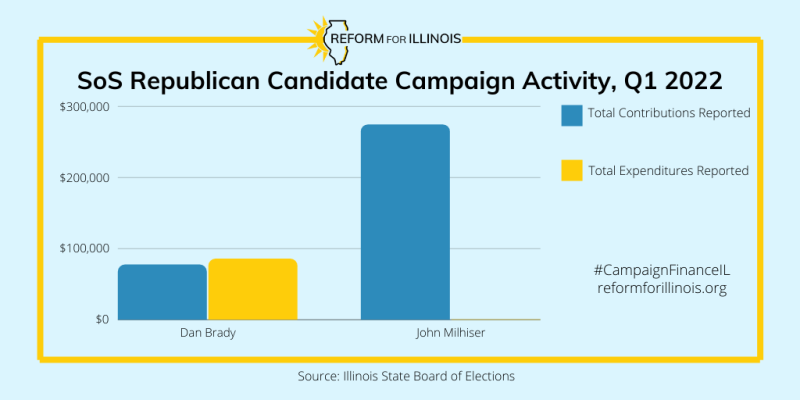
On the Republican side, Dan Brady has raised $77K and has $242K in the bank as of April. Brady raised $13K from small donations of $150 or less, accounting for about 17% of his total fundraising.
John Milhiser reported receiving $274K in the first quarter of 2022, and his campaign has $273K cash on hand. His largest contribution was a $100K transfer from the Sangamon County Republican Central Committee, with an additional $50K coming from the Sangamon County Republican Foundation. Milhiser also appears to have Republican gubernatorial candidate Richard Irvin’s backing: Irvin’s candidate committee transferred another $50K to Milhiser’s campaign account on April 1st.
Chicago Mayor
The Chicago mayoral race is starting to heat up, with both Willie Wilson and Ald. Raymond Lopez entering the race in the last few weeks. Wilson loaned himself $5 million shortly after announcing his campaign, giving him a significant advantage in the money race so far. Wilson’s loan also triggered the self-funding provision, meaning that all candidates for Chicago mayor are no longer subject to contribution limits. Mayor Lightfoot –– who still has not announced her reelection bid –– raised $737K this quarter and has $1.3 million cash on hand.
We’ll continue keeping an eye on the big money in Illinois races, but it’s always good to do your own research, too. Check out our easy-to-use database, Reform for Illinois’ Sunshine Campaign Finance Tracker, to see who’s funding — and influencing — your candidates and elected officials.
Back
